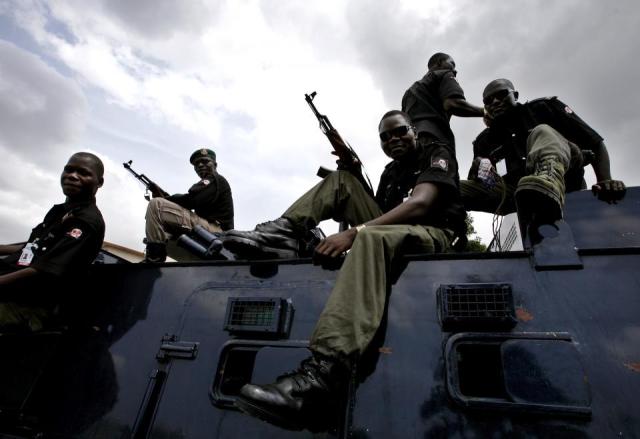World  Conor Gaffey, Newsweek 3 hours ago
Conor Gaffey, Newsweek 3 hours ago
Police in Nigeria Caught the Country's Most Wanted Kidnapper, and Now He's Suing Them
 Conor Gaffey, Newsweek 3 hours ago
Conor Gaffey, Newsweek 3 hours ago Earlier in June, Nigeria's police caught the country's most-wanted kidnapper, responsible for charging million-dollar ransoms for high-profile abductees.
But even despite his arrest, the accused criminal—Chukwudi Dunem Onuamadkie, known by his alias of Evans—has proved to be a thorn in the Nigerian government's side. Evans has given several interviews to media while in detention and become something of a social media celebrity.
Now the kidnapper is trying to sue the Nigerian police and take the government to court too.
 A suspect identified as Chukwudi Dumeme Onuamadike, also known as Evans, is paraded after his arrest by police in Lagos, Nigeria. This photo was distributed on June 11. Nigeria Police Force
A suspect identified as Chukwudi Dumeme Onuamadike, also known as Evans, is paraded after his arrest by police in Lagos, Nigeria. This photo was distributed on June 11. Nigeria Police Force Evans's lawyer filed a case Wednesday at the high court in Lagos, Nigeria's economic hub on the Atlantic coast, alleging that he had been illegally detained, Nigeria's Premium Times reported. The suspect requested that he be either immediately charged to court or released unconditionally.
Police captured Evans and six of his associates on June 10, following a gun battle at an upmarket Lagos property. They also seized weapons and munitions, including more than 1,000 rounds of AK-47 ammunition, according to security forces.
 An image released by the Nigeria Police Force shows weapons and ammunition retrieved during an operation to capture an alleged kidnapper and his associates in Lagos, Nigeria. This picture was distributed on June 11. Nigeria Police Force
An image released by the Nigeria Police Force shows weapons and ammunition retrieved during an operation to capture an alleged kidnapper and his associates in Lagos, Nigeria. This picture was distributed on June 11. Nigeria Police Force The alleged kidnapper's complaint targeted the inspector general of police, Ibrahim Idris; the commissioner of police in Lagos state; the Nigeria Police Force as a whole; and an anti-robbery squad in the Lagos police force. Evans's father also submitted an affidavit as part of the complaint, saying that his son had been subject to a trial by media and had not been given a fair hearing.
According to Nigeria's constitution, suspects should appear before a court a maximum of two days after the date of their detention, unless there are extenuating circumstances.
A spokesman for the Nigeria Police Force, Jimoh Moshood, said the police had obtained a court order to detain Evans for three months to allow for a proper investigation, Premium Times reported. The investigation would involve police traveling to Ghana, where Evans reportedly owned several properties, South Africa and elsewhere.
 Nigerian police sit atop an armored personnel carrier outside the headquarters of the Independent National Electoral Commission in Lagos, on April 20, 2007. Finbarr O'Reilly/Reuters
Nigerian police sit atop an armored personnel carrier outside the headquarters of the Independent National Electoral Commission in Lagos, on April 20, 2007. Finbarr O'Reilly/Reuters Kidnapping for ransom is a serious problem in Nigeria, with many Western governments warning would-be travelers of the risk of abduction. Kidnappers often target wealthy Nigerians or foreigners in the hope of demanding a large ransom.
In February 2015, U.S. missionary Phyllis Sortor was kidnapped in Kogi state, central Nigeria, and released after two weeks. Her abductors originally demanded a $300,000 ransom. Sortor's family later confirmed that they had paid the kidnappers but said it was much less than the sum demanded, according to Reuters. The family also claimed to be the first to benefit from an updated U.S. policy that meant that federal agents could advise the families of abductees on talking to the abductors but play no role in the ransom negotiation process.
More from Newsweek
No comments:
Post a Comment